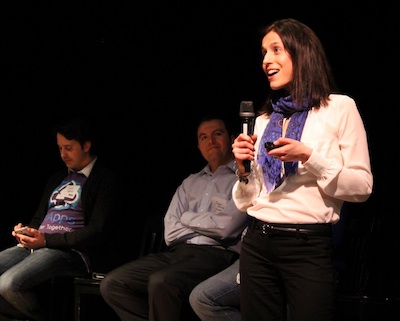
Taylor Salinardi talks about Bon App. (Photo by Aditi Pai)
This week, MobiHealthNews co-hosted a special healthcare-themed Mobile Monday event at Ned Devine's bar here in Boston to showcase some local mobile health startups. The five startups presented a diverse range of products tackling different challenges in mobile health.
The first company, RxApps, is leveraging SMS and responsive web as tools to improve patient compliance.
RxApps, a Rock Health company formerly known as PrescribableApps, made their first public presentation at a Mobile Monday event a year ago. CEO and co-founder John Moore III (son of John Moore of Chillmark Research) presented, showing some slides from the app and some sample text messages. Physicians can use RxApps with patients who have mental health conditions. The platform sends customized check-in messages via SMS and mobile that ask patients about their mood or weight, worded so patients can respond easily with a few numbers.
That data is sent back to the physician and also recorded so it can be tracked, and patients and providers can see visual representations of fluctuations in their mood and status.
"In mental illness there are very few competitors, most of them are exclusively consumer-facing," Moore said, in response to a question about what makes RxApps different from competitors. "We're engaging doctors, that's the big difference, and we're using SMS. We're engaging them with push prompts. We're doing both mobile web and text messages. We're trying to bridge that gap, make it accessible to anyone."
Next to present was Javier Perez from FeedHenry, a company that builds mobile apps for enterprise clients, including some in the healthcare space. Perez presented an app the company built for Courtagen Life Sciences to give doctors mobile access to the results of specific genetic tests Courtagen offers.
"Doctors have access to this data, but they have a 20-page pdf report they have to read. So mobility was a no-brainer," Perez said. "They needed to have everything on an iPad, they needed that color-coded gene map, to see those genes and see if there are any problems. This is where FeedHenry comes into play. We are a cloud-based platform that sits right in between those enterprise systems and the mobile app."
He said FeedHenry provides HIPAA-compliance and security for companies in the apps it builds.
Taylor Salinardi, director of research and analytics at Bon'App, was next up, laying out the problems her company's app is trying to solve.
"Consumers are confused about what's in their food," she said. "Nutrition fact labels are confusing. They're complicated. Do you know what saturated fat is? Trans fat? Unsaturated fatty acids? Do you know what the good fat is? The bad fat? Well we tell you what the bad fat is."
Bon'App, a free, voice-activated app already available for download from the iOS AppStore, provides nutrition information about food before you eat it, with an intuitive battery display that tells you how the food will contribute to your daily goals and limits for fat, sugar, calories, and salt, turning from green, to yellow, to red, to black.
Salinardi walked the crowd through an example use case of being at Starbucks and "craving something caramel." By speaking "Starbucks caramel" into the app, it presents the user with the various popular options, and they can choose the best one.
Founder and CEO Sombit Mishra started his presentation on QMedic with a slide of the old "I've fallen and I can't get up" commercial that's come to be shorthand for mPERS and fall detection systems.
"Over 80 percent of seniors don't press the button an hour after falling. Over 85 percent don't wear the device consistently," Mishra said of traditional mPERS devices. "QMedic is the only wearable sensing platform that continually and passively monitors physical activity, sleep, and falls in the home without requiring battery recharge."
QMedic's platform actually started out as an activity tracker like Fitbit and pivoted into mPERS. The waterproof, wristworn device collects longitudinal data constantly and has a battery that lasts over a year. It can detect and alert a caregiver when the wearer falls, sleeps worryingly late, or neglects to wear the device.
Finally, Neumitra's Robert Goldberg presented on the company's wristworn stress sensor and companion app, speaking about the importance of dealing with stress. Neumitra is also a Rock Health company.
"We're losing more veterans to suicide today than to combat," he said. "In addition, the leading cause of death among undergraduate students is suicide."
Neumitra is developing a biofeedback device that constantly monitors stress levels via the autonomic nervous system and sends an alert to the user's phone when it detects high levels of stress. The connected app makes suggestions to reduce stress, like listening to music or playing a game on the phone. The watch can also buzz when it detects a stress event. The company is also working with public health departments to create stress maps of campuses and cities from the aggregate data generated by users.
More than 200 mobile developers and interested parties watched the presentations then stayed to mingle with the presenters, each other, and MobiHealthNews. See more pictures from the event on our Facebook page.

















